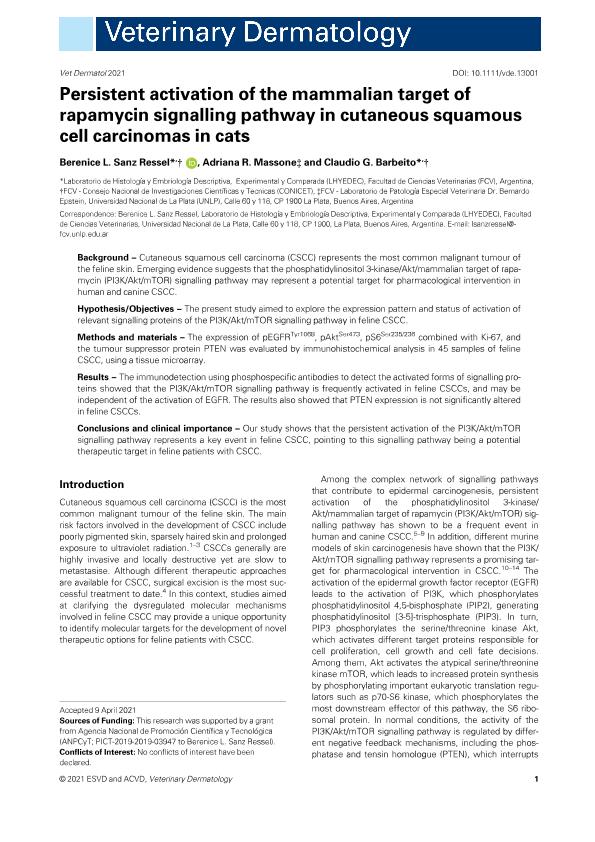Artículo
Persistent activation of the mammalian target of rapamycin signaling pathway in cutaneous squamous cell carcinomas in cats
Fecha de publicación:
07/2021
Editorial:
Wiley Blackwell Publishing, Inc
Revista:
Veterinary Dermatology
ISSN:
0959-4493
Idioma:
Inglés
Tipo de recurso:
Artículo publicado
Clasificación temática:
Resumen
Background: Cutaneous squamous cell carcinoma (CSCC) represents the most common malignant tumour of the feline skin. Emerging evidence suggests that the phosphatidylinositol 3-kinase/Akt/mammalian target of rapamycin (PI3K/Akt/mTOR) signalling pathway may represent a potential target for pharmacological intervention in human and canine CSCC. Hypothesis/Objectives: The present study aimed to explore the expression pattern and status of activation of relevant signalling proteins of the PI3K/Akt/mTOR signalling pathway in feline CSCC. Methods and materials: The expression of pEGFRTyr1068, pAktSer473, pS6Ser235/236 combined with Ki-67, and the tumour suppressor protein PTEN was evaluated by immunohistochemical analysis in 45 samples of feline CSCC, using a tissue microarray. Results: The immunodetection using phosphospecific antibodies to detect the activated forms of signalling proteins showed that the PI3K/Akt/mTOR signalling pathway is frequently activated in feline CSCCs, and may be independent of the activation of EGFR. The results also showed that PTEN expression is not significantly altered in feline CSCCs. Conclusions and clinical importance: Our study shows that the persistent activation of the PI3K/Akt/mTOR signalling pathway represents a key event in feline CSCC, pointing to this signalling pathway being a potential therapeutic target in feline patients with CSCC.
Palabras clave:
CAT
,
CSCC
,
MOLECULAR TARGETS
,
MTOR
,
SIGNALING MOLECULES
,
SKIN
Archivos asociados
Licencia
Identificadores
Colecciones
Articulos(CCT - LA PLATA)
Articulos de CTRO.CIENTIFICO TECNOL.CONICET - LA PLATA
Articulos de CTRO.CIENTIFICO TECNOL.CONICET - LA PLATA
Citación
Sanz Ressel, Berenice Liyare; Massone, Adriana Raquel; Barbeito, Claudio Gustavo; Persistent activation of the mammalian target of rapamycin signaling pathway in cutaneous squamous cell carcinomas in cats; Wiley Blackwell Publishing, Inc; Veterinary Dermatology; 32; 6; 7-2021; 1-8
Compartir
Altmétricas




